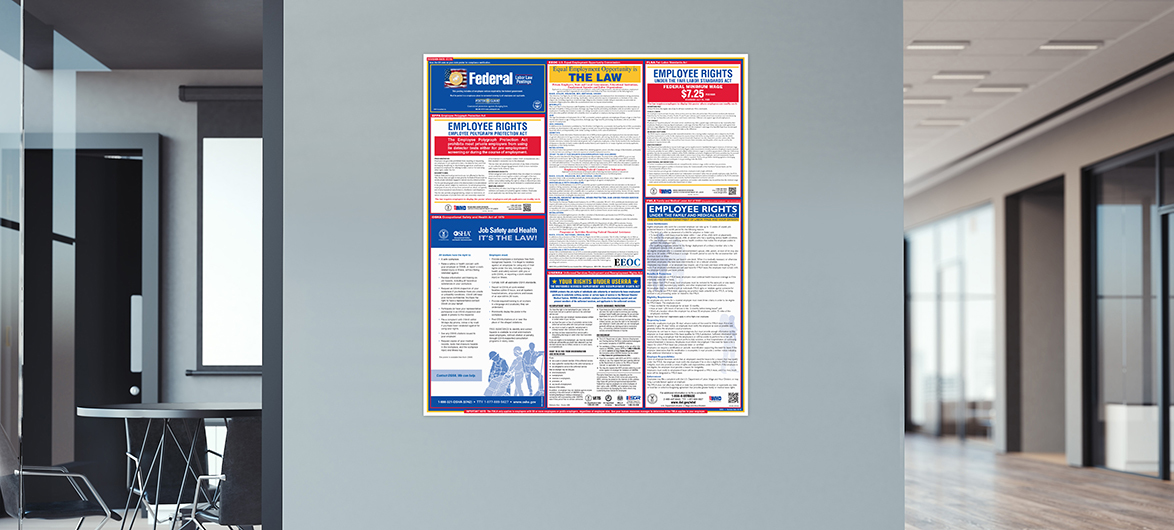Labor law posters are confusing for small business owners. What are they? Why do you need them? What do you have to display? What if you don’t?
The biggest challenge is trying to tackle postings on your own. It’s not an easy process, so I understand the avalanche of questions that small business owners face. To help you better understand the importance of workplace postings, here’s a typical conversation I have with small business owners about compliance and the consequences of not following the law.
What are the federal posting requirements for my business?
Currently, there are six mandatory federal postings for all U.S. employers with at least one full-time employee:
- Equal Employment Opportunity (EEO): Covers anti-discrimination provisions and legally protected characteristics.
- Occupational Safety and Health Act (OSH Act): Highlights important workplace safety measures.
- Family and Medical Leave Act (FMLA): Explains employee leave eligibility and benefits, as well as employer responsibilities (required if you have 50 or more employees).
- Uniformed Services Employment and Reemployment Rights Act (USERRA): Addresses re-employment after military leave, anti-discrimination provisions and health insurance issues.
- Fair Labor Standards Act (FLSA): Notifies employees of the federal minimum wage rate, overtime rules and child labor laws.
- Employee Polygraph Protection Act (EPPA): Describes the rules around lie detector tests in employment (a posting requirement even if you don’t use lie detectors).
So, am I in compliance if I display these federal posters?
Unfortunately, it’s not that simple. You’re responsible for state postings too. And no two states have the same requirements because each state has its own government agencies and passes its own laws. Depending on the state, this can add up to 15 additional posters — for a total of 21 federal and state postings per location. You may have extra posting obligations if you’re in certain cities or counties. And that’s not all! If you’re in certain industries, or have government contracts, your posting requirements go even deeper.
That sounds like a lot of work. There’s no way this is seriously enforced … or is it?
Too many small business owners underestimate the importance of posting compliance, thinking the risk is so minimal that it doesn’t really matter. If you take this approach, you may be opening your business to hefty fines—especially if you’re in violation at multiple locations. Federal fines can be more than $34,000 per location for posting violations, and state and local posting fines typically range from $100 to $1,000 per violation. (Each posting carries its own fine because every agency and posting law is different.) This is a risk most businesses are not willing to take.
I can’t imagine there is such thing as poster police. The chances of being caught have to be miniscule, right?
You may be surprised. While it’s not likely for federal agents to knock on your door just to see if your posters are compliant, they may visit for other reasons. Most posting fines are assessed when federal or local agents are on the premises for a Form I-9 audit, an OSHA inspection, an EEOC onsite investigation or even a Department of Labor (DOL) follow-up to an employee complaint. The visit could be completely unrelated to labor law posters, but the agencies will check posting compliance as part of an onsite visit. On a state and local level, we do see random poster audits conducted by enforcement agencies, even without other complaints being investigated. Posters also come into play in employee lawsuits, where you can forfeit significant legal defenses or become subject to inflated damage awards, just because of a missing or outdated posting.

Okay, so I see this is a risk-management issue for me. If I update my posters annually, am I good?
Annual checkups are not nearly enough. Depending on your state or city, regulations can change frequently, requiring updates throughout the year. On average in the U.S., there are 150 state posting changes per year – and at least half of these require immediate poster updates or replacements. Local changes occur even more frequently. If you’re only updating your posters once per year, you may be compliant with certain postings (such as your state minimum wage), but out of date with other postings.
Can I avoid trouble by contacting a couple of agencies to get all the necessary federal, state and local postings?
To handle posting compliance on your own, you must research every posting requirement (and change) and contact the appropriate agencies in your jurisdiction—federal, state and local. This takes considerable time and effort, which makes it a daunting task for most businesses. It’s even more challenging because federal, state and local agencies don’t have work-share agreements, so there’s no central website for all necessary posters. In fact, about 175 state agencies across the U.S. are responsible for issuing at least 380 mandatory posters. To manage posting compliance for just one business location, you would have to contact up to nine agencies for your federal and state posters. On top of that, around 22,000 cities and counties have their own governing agencies and ordinances. Not all of them have required postings, but many do. Simply put, the government does not provide a “one-stop shop” for federal, state and local posters. Making matters worse, the agencies do not notify businesses when these posting requirements change.
Who has time to do all that? I sure don’t! Are there any resources out there that consolidate this information so I don’t have to?
As an employer, you face a barrage of ever-changing labor regulations at the federal, state and local level. An online tool like the Poster Guard 1 Smart App can eliminate the uncertainty and effort. It addresses all posting requirements for your specific location in a single, streamlined resource.
- If you have at least one employee, you must display federal, state and local workplace postings.
- Fines for noncompliance are steep — $34,000 per location for federal posting violations and from $100 to $1,000 per violation at state and local levels.
- Most noncompliant fines are assessed when agents visit for reasons completely unrelated to labor law posters.
- Frequent changes to federal, state and local laws require immediate poster updates.






